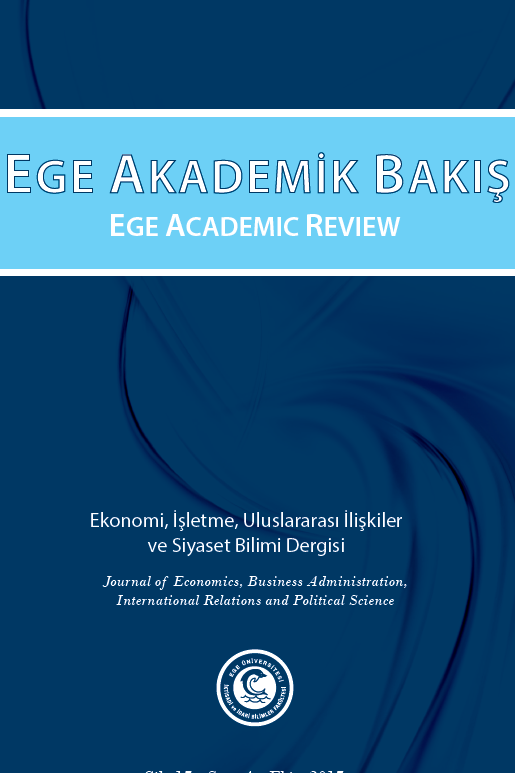Avrupa Birliği'nin Beşinci Genişleme Süreci: Ekonomik ve Siyasi Boyutlar
Bu çalışmada, AB’nin beşinci genişleme sürecine odaklanılarak, mevcut üyelerin ve adayların müzakere sürecinde hangi ekonomik ve siyasi faktörlere önem verdikleri incelenmektedir. Beşinci genişlemede, Merkezi ve Doğu Avrupalı adaylar, ekonomik ve siyasi olarak oldukça farklı bir sistemden geldikleri için bir anlamda geri olarak tanımlandılar. Mevcut üyeler, adayların şarta bağlılık kuralları çerçevesinde, derin bir dönüşüm sürecinden geçmesini beklediler; bu dönüşümün arz yönü maliyetini de minimum düzeyde tutmaya çalıştılar. Üyelik süreci içerisinde adayların işleyen bir piyasa ekonomisine ve demokrasiye geçmek için yapmaları gerekenler; genişlemenin mevcut üyeler ve adaylar için muhtemel ekonomik ve siyasi etkileri mümkün olduğunca detaylı bir şekilde değerlendirilmeye çalışılmıştır. Bu bağlamda, eski üyelere muhtemel göç dalgası, istihdam yapısına olası etkiler, ekonomik yakınsama süreleri, rekabetçilik; adaylardaki iç politik yapı, demokratikleşme, hukukun üstünlüğü, azınlıklar; sınır sorunları, devlet kapasitesinin arttırılması gibi konular değerlendirmelerde önemli başlıklar olarak yer almıştır
Anahtar Kelimeler:
Avrupa Birliği, Avrupa Birliği’nin beşinci genişlemesi, şarta bağlılık
European Union’s Fifth Enlargement Process: Economic and Political Dimensions
This study, while focusing on the fifth enlargement, tries to analyze the economic and political factors that are considered important by the current and prospective members in the process. In the fifth enlargement, because they had just emerged from a very different system, the candidates from the Central and Eastern Europe were considered as inferior in a sense. The current members expected a deep transformation, in accordance with the framework of conditionality, from the candidates while they also tried to keep its supply side cost at a minimum. In the accession process, the prerequisite reforms for the candidates in order to facilitate their transition to a functioning market economy and democracy; the potential effects of the enlargement on the current and prospective members were evaluated in detail. In this context, a possibility of a tide of immigration to the current members, potential effects on the employment, the required period for economic convergence, competitiveness; domestic political structure of the candidates, democratization, rule of law, minorities, border conflicts, promotion of state capacity were among the important issues
___
- Arnason, J. P. (2000) “Communism and Modernity” Daedalus, 129(1):61-90.
- Ash. T. G. (2007) “Europe’s True Stories”
- www.prospectmagazine.co.uk/2007/02/europestrues- tories/
- Avrupa Komisyonu (2006) “Enlargement, Two Years After: An Economic Evaluation” European Commission Directorate-General For Economic And Financial Affairs Occasıonal Papers No. 24.
- Avrupa Komisyonu (2007) Enlargement Strategy and Main Challenges 2007-2008” COM 2007 663 final.
- Barroso J. M. (2008) Turkey: Master of the Straits, Master of its Destiny (SPEECH/08/188) Türkiye Büyük Millet Meclisi, 10 Nisan).
- Barysch, K. (2003) “Does Enlargement Matter for the EU Economy?’ CER Policy Brief, Centre for Euro- pean Reform, http://www.cer.org.uk/pdf/policybrief_ enlargement_economy.pdf.
- Barysch, K. (2006) “Is Enlargement Doomed?” Pub- lic Policy Research, 13(2):78-85.
- Breuss, F. (2002) “Benefits and Dangers of EU En- largement” Empirica, 29(3): 245-274.
- of The Western Balkans, Organisation for Economic Co
- &DocID=66956&insite=1, (21. 07. 2009).
- Steunenberg, B ve A. Dimitrova (2007) “Complian- ce in the EU Enlargement Process: The Limits of Condi- tionality” European Integration Online Papers, 11(5):1-18.
- Jose I. Torreblanca (2001) The Reuniting of Europe: Promises, Negotiations, and Compromises, United King- dom, Ashgate Publications.
- Wiener, A. (2002) “Finality vs. Enlargement Consti- tutive Practices and Opposing Rationales in the Recons- truction of Europe NYU School of Law” Jean Monnet Working Paper Series, No. 8/02.
- Yeşilada B. Ve B. Efird, (2006) “Competition among Giants: A Look at How Future Enlargement of theEu- ropean Union Could Affect Global Power Transition” International Studies Review, 8:607–622.
- Zielonka, J. (2007) “Plurilateral Governance in the Enlarged European Union” Journal of Common Market Studies, 45(1):187–209.
- ISSN: 1303-099X
- Yayın Aralığı: Yılda 4 Sayı
- Başlangıç: 2000
- Yayıncı: Ege Üniversitesi
Sayıdaki Diğer Makaleler
Aytül Ayşe CENGİZ, Ahmet Emre DEMİRCİ
Tüketicilerde Suçluluk Duygusu: Öncül ve Sonuçları Üzerine Bir Model
Ayla Özhan DEDEOĞLU, İpek KAZANÇOĞLU
Volkan ÖZBEK, Ümit ALNIAÇIK, Fatih KOÇ
Avrupa Birliği'nin Beşinci Genişleme Süreci: Ekonomik ve Siyasi Boyutlar
Ürün Farklılaşması ve Yapma-veya-Satın Alma Kararları için Girdi Fiyatlarının İlgisizliği
Türk Kamu Yönetim Sistemi için Bir İnteraktif e-Katılım Modeli: SİBİYO
